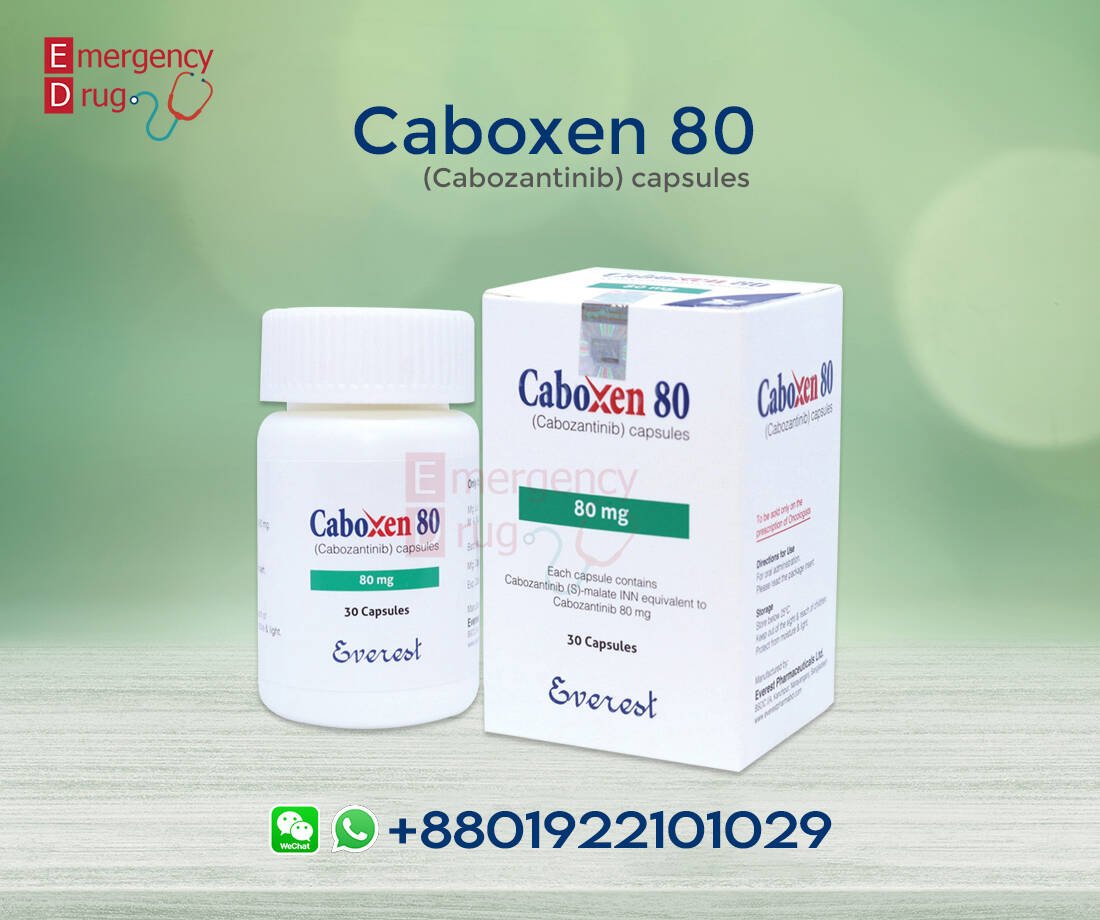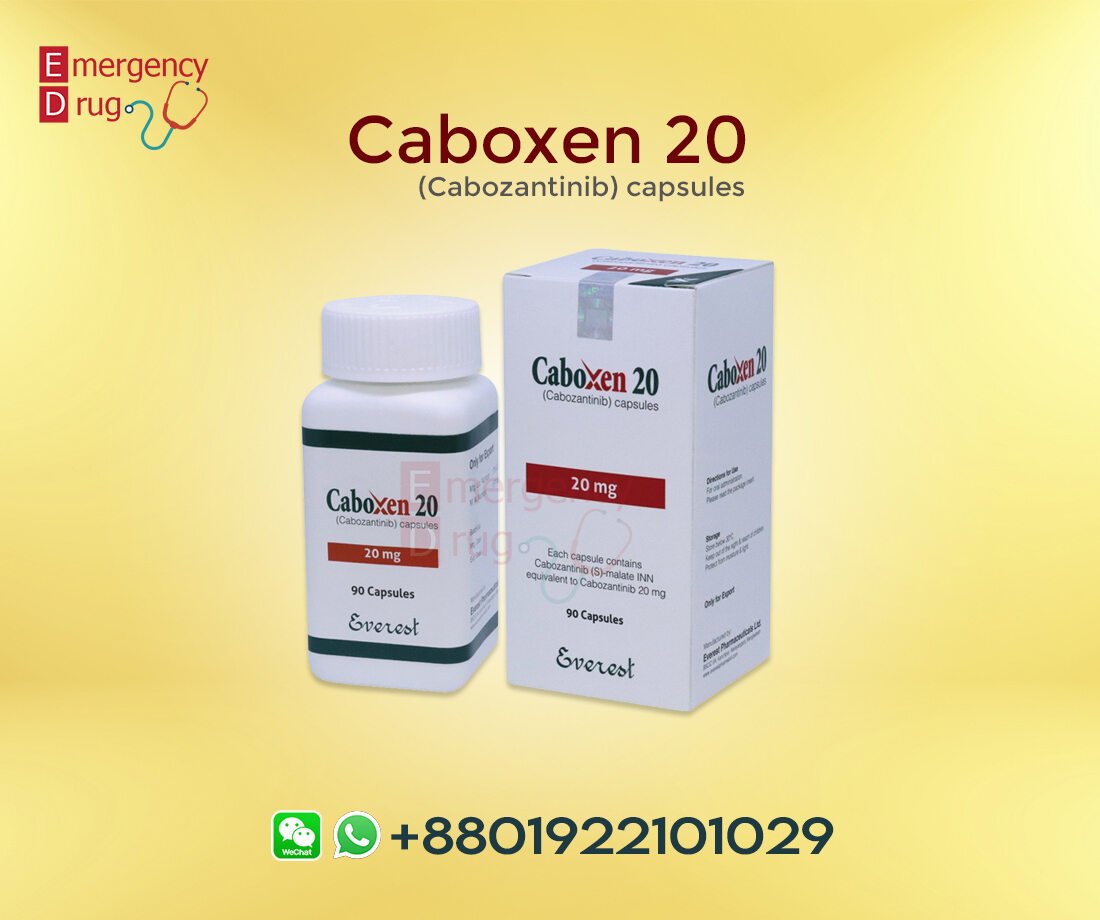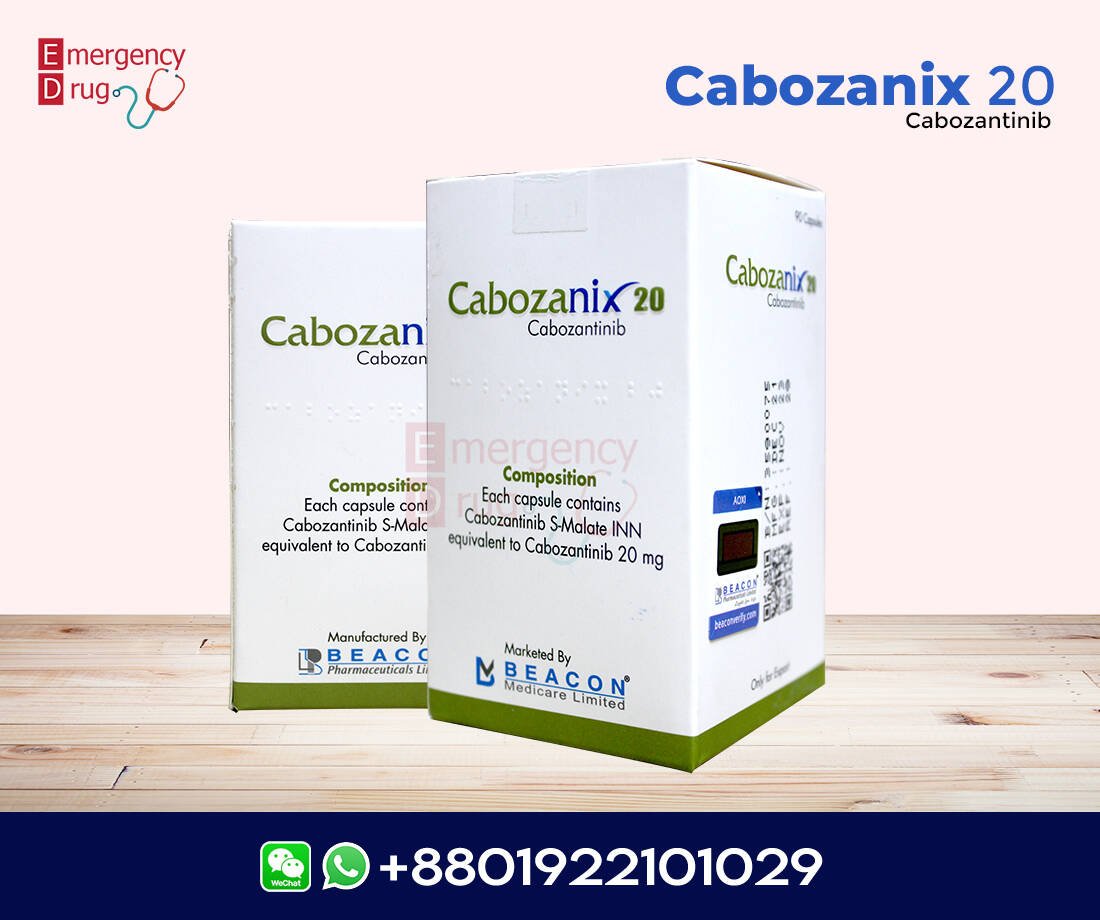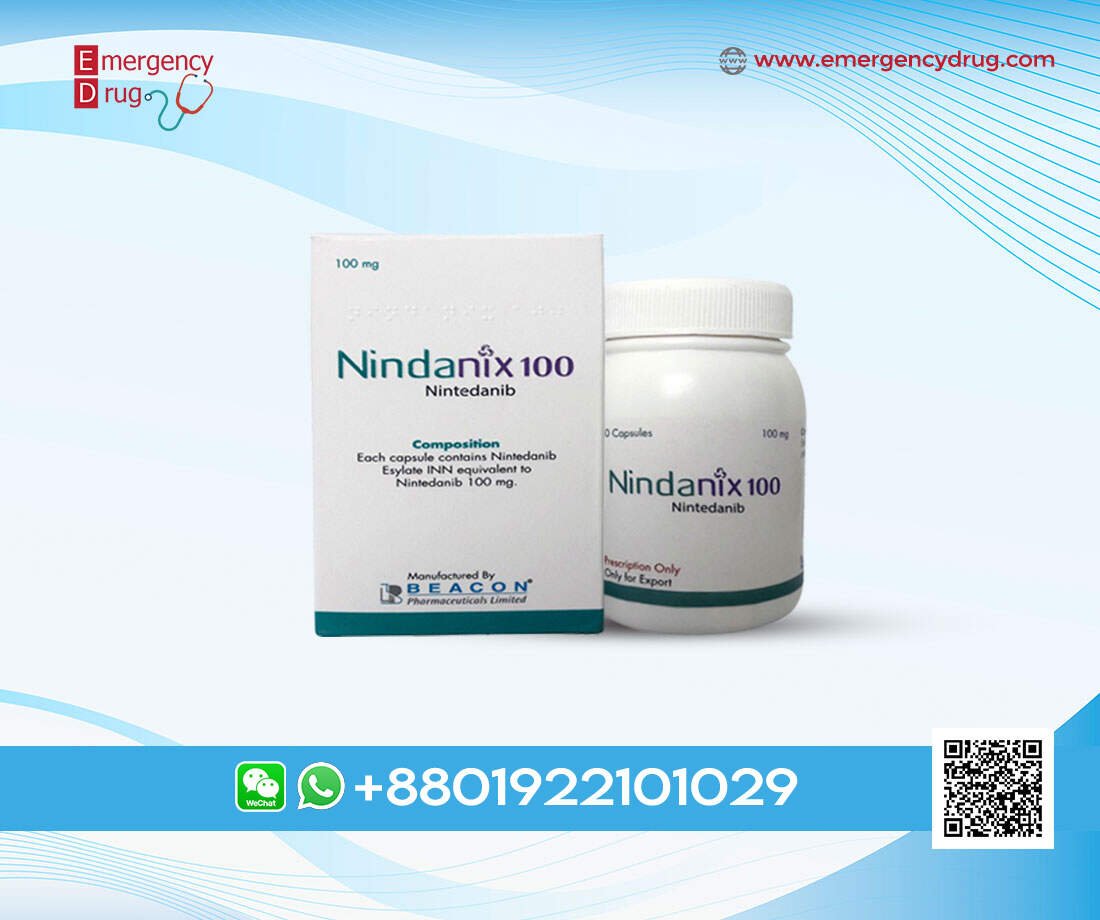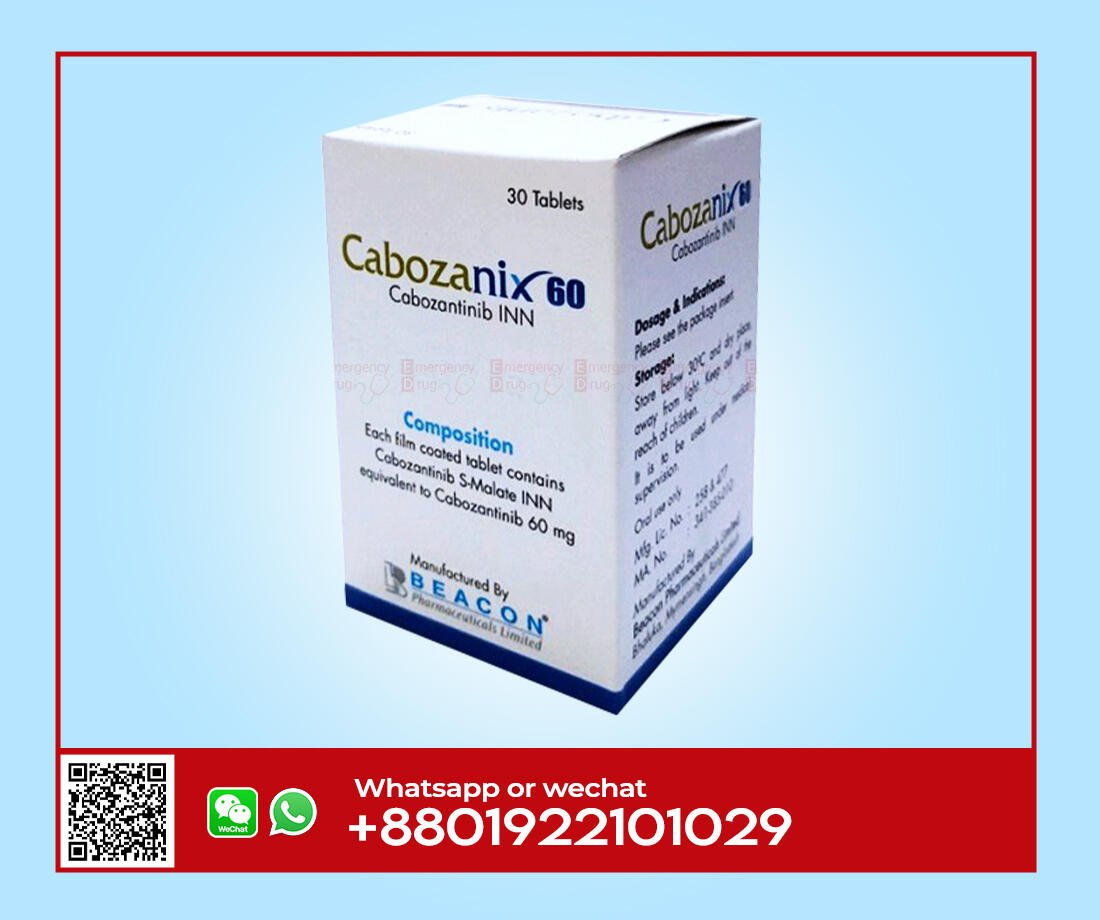
Cabozanix (Cabozantinib) 60 MG – 30 Tablets
Price: $890.00
Product Feature:
| Manufacturer | : Beacon Pharma Ltd. |
| Indication | : Thyroid cancer |
| Formulation | : Tablet |
| Strength | : 60 mg |
| Quantity | : 30 Tablets |
| Storage | : Below 30°C |
| Registrations | : Export Only |


Description
Cabozanix 60 mg (Cabozantinib) is a drug that slows the growth of blood vessels that feed tumors. It is approved for medullary thyroid cancer. However, studies have shown that prostate and ovarian tumors respond to it. Researchers want see if Cabozantinib can be a safe and effective treatment for urothelial cancer.
Cabozanix (Cabozantinib) is a targeted therapy drug called a tyrosine kinase inhibitor. It use to treat medullary thyroid cancer and kidney cancer that has spread.
Cabozanix capsules use to treat medullary thyroid cancer that removed without an operation, or that has spread to other parts of the body.
Cabozantinib tablets use to treat a type of kidney cancer call renal cell cancer that has spread to other parts of the body. They may also use to treat primary liver cancer.
Cabozantinib may sometimes use to treat other cancers or as part of a clinical trial.
Cabozanix is Given
Cabozanix comes in tablets or capsules, so you can take it at home.
During treatment you usually see a cancer doctor, a cancer nurse or a specialist nurse, and a specialist pharmacist. This is who we mean when we mention doctor, nurse or pharmacist in this information.
Always take Cabozantinib exactly as your nurse or pharmacist explained. This is important to make sure it works as well as possible for you. Your doctor will talk to you about how long to take Cabozantinib for.
Taking Cabozanix
You take Cabozantinib once a day at the same time each day. Take your tablets or capsules with a glass of water, one hour before you eat or two hours after you eat. Don’t chew or crush the tablets or open the capsules before you take them as this may increase side effects. Avoid eating grapefruit and drinking grapefruit juice during your treatment as it may increase side effects.
If you forget to take your Cabozanix and it is more than 12 hours until the next dose, take it as soon as you remember. If it is less than 12 hours until the next dose, do not take the missed dose – take your usual dose at the usual time the next day. You should never take a double dose.
There are some important things to remember when taking your tablets or capsules:
- Keep them in the original packaging and at room temperature, away from heat and direct sunlight.
- Keep them safe and out of sight and reach of children.
- If your treatment is stopped return any unused capsules or tablets to the pharmacist.
Side Effects
We explain the most common side effects of this treatment here. We also include some less common side effects.
You may get some of the side effects we mention, but you are unlikely to get all of them. If you are also having treatment with other cancer drugs, you may have some side effects that we have not listed here. Always tell your doctor, nurse or pharmacist about any side effects you have.
Your doctor can give you drugs to help control some side effects. It is important to take them exactly as your nurse or pharmacist explains. This means they will be more likely to work for you. Your nurse will give you advice about managing your side effects. After your treatment is over, most side effects start to improve.
Serious and life-threatening side effects
Some cancer treatments can cause severe side effects. Rarely, these may be life-threatening. Your cancer doctor or nurse can explain the risk of these side effects to you.
Contact the hospital
Your nurse will give you telephone numbers for the hospital. If you feel unwell or need advice, you can call them at any time of the day or night. Save these numbers in your phone or keep them somewhere safe.
Information about Cabozanix
Cancer and some cancer treatments can increase the risk of a blood clot. Symptoms of a blood clot include:
- Throbbing pain, redness or swelling in a leg or arm
- Suddenly feeling breathless or coughing
- Sharp chest pain, which may be worse when you cough or take a deep breath.
If you have any of these symptoms, contact the hospital straight away on the 24-hour contact number you have been given.
A blood clot is serious, but it can be treated with drugs that thin the blood (anticoagulants). Your doctor or nurse can give you more information.
You can help reduce the risk of developing a blood clot by:
- Staying active during treatment
- Drinking plenty of fluids, especially water.
For more Oncology medicine, visit our SHOP

